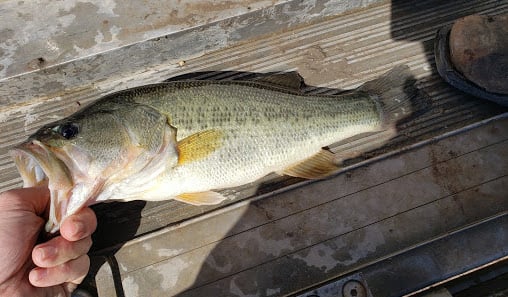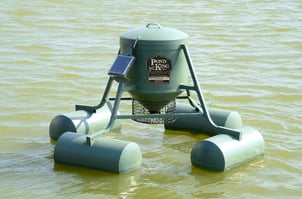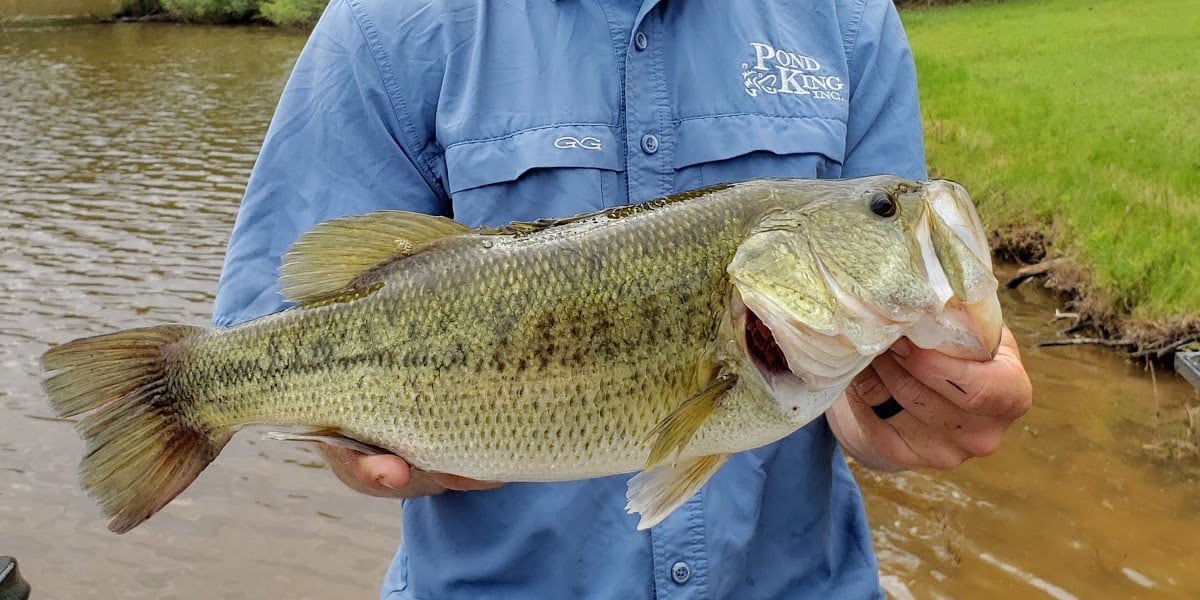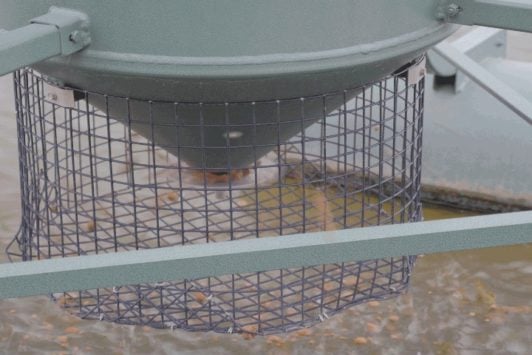The goal of catching a trophy-class bass has long been the dream of many anglers. It can be done, but it takes some work on your part—and a little patience. If you don't have the patience, consider stocking pellet-trained bass. Just be sure to weigh the pros and cons, first.
Why stock feed-trained bass
 When it comes to stocking Largemouth Bass into private ponds, it has become increasingly common to stock fish large enough to break out the fishing gear the day after fish are stocked into their pond. The most common way this goal is reached is with pellet-feed-trained Largemouth Bass from a hatchery - like the fish shown above. Stocking these fish has its benefits, yes, but it also has its drawbacks.
When it comes to stocking Largemouth Bass into private ponds, it has become increasingly common to stock fish large enough to break out the fishing gear the day after fish are stocked into their pond. The most common way this goal is reached is with pellet-feed-trained Largemouth Bass from a hatchery - like the fish shown above. Stocking these fish has its benefits, yes, but it also has its drawbacks.
How to feed-train bass
First off, Largemouth Bass as a species do not become as accustomed to consuming a pelleted feed as easily as Bluegill or Channel Catfish. Bass have to trained from the time they are fry to accept a pelleted feed. This is because their predatory instinct is so strong that if offered any natural forage in lieu of a pelleted feed they will never utilize the pelleted ration. At the hatchery, these fish are fed a pelleted ration every day until they reach an average size of 1 lb. By this time the fish are highly accustomed to consuming only this pelleted food source.
The pros of feed-trained bass
The obvious benefit to stocking these fish is the advanced size. These fish, just like a normal Bass, put up a fight that any angler would enjoy. Their larger size increases their heartiness and improves the success rate of stocking. Also, because they are feed trained they will not put an immediate strain on your forage fish population.
The cons of feed-trained bass
That being said, there are some drawbacks to stocking feed trained Bass. There has to be an automated feeder available immediately upon stocking these fish providing a high protein food source, or you have to personally distribute feed to them daily. Remember these fish have had their predatory instinct temporarily disbanded and are used to eating a floating food source at the same time daily. The major drawback that deters most customers from stocking these fish is the increased cost per individual. This isn’t because hatcheries are trying to capitalize on the wants of the customer. Instead, there are more resources and time put into training and allowing these Bass to reach a desirable size.
To feed-train or not to feed-train?
 Some of the drawbacks described here can be reversed ... to a certain degree. Yes, you will need to provide a pelleted feed immediately upon introducing these fish into your pond (Pond King offers a couple of fish feeder options). With proper forage stocking, however, you can slowly reduce the amount of feed provided over about a 6-12 month window to slowly revert these individuals back to a version of their predatory instincts. What I mean by this is they will always need that supplemental food source that they are accustomed to, but they will begin to react and consume baitfish that pass by them. This process will also help to increase the fishing success, producing more reactionary strikes. Unfortunately, there is no remedy to the increased cost.
Some of the drawbacks described here can be reversed ... to a certain degree. Yes, you will need to provide a pelleted feed immediately upon introducing these fish into your pond (Pond King offers a couple of fish feeder options). With proper forage stocking, however, you can slowly reduce the amount of feed provided over about a 6-12 month window to slowly revert these individuals back to a version of their predatory instincts. What I mean by this is they will always need that supplemental food source that they are accustomed to, but they will begin to react and consume baitfish that pass by them. This process will also help to increase the fishing success, producing more reactionary strikes. Unfortunately, there is no remedy to the increased cost.
However, there is a thought process though that makes it a little easier to accept the cost. These larger fish are mature and ready for the spawning season, and their increased size and weight also increase the potential eggs they are able to lay per season. Additionally, the offspring of these feed trained Bass will have all of their natural instincts that had been trained out of their parents, so as the years pass, the number of fish that react to a lure will continue to increase. The photo below is a good example of the success you can achieve by stocking feed-trained bass. 
All in all, the option to stock these advanced fish is one that has many caveats that need to be well-considered before the final decision has been made. These fish suit some individuals better than others and can provide many enjoyable memories for years to come. If you have any other questions or would like to discuss the option of stocking feed trained Bass into your pond, feel free to contact me anytime at garrett@pondking.com.
If you live outside our regular service area, but you're trying to raise trophy-class bass, consider checking out our DIY Pond Management App.
Until next time, we'll see y’all down at the pond.



